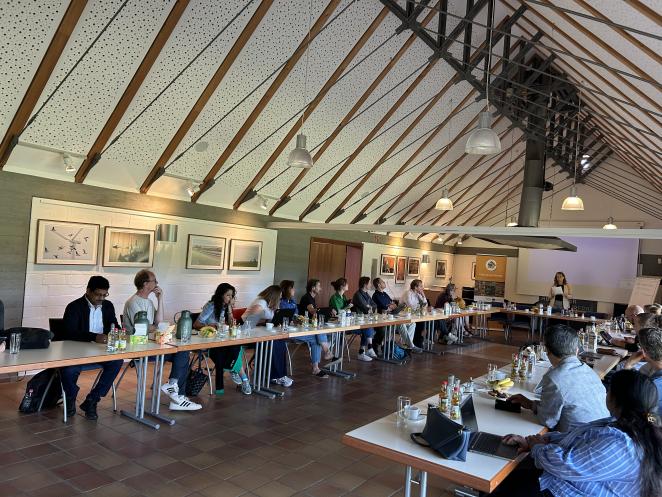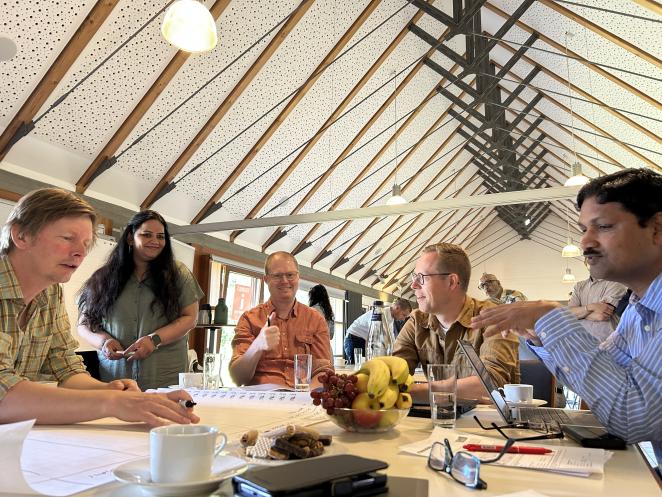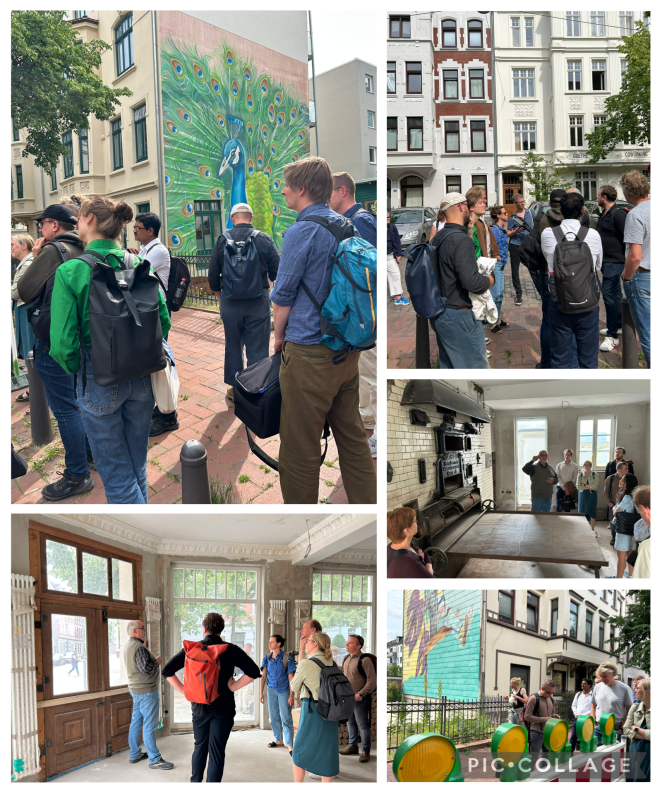That's quite a 'catchy' headline for this item about our latest Circular Trust Building partner meeting in Bremerhaven on 18–19 June!
To explain, the event was officially kicked off by Mrs Andrea Toense, Stadträtin für Klima und Umwelt, who shared a fun fact about the city: it produces over 7 million fish fingers a day! That light-hearted opening set the tone for two days of dynamic exchange, insight, and collaboration.

CTB partners meet in Bremerhaven
Mapping readiness, barriers & strategies
The programme for this latest partner meeting was structured to include updates on all work packages and ensure everything is progressing according to plan. In WP1 the results of the CTB survey were presented by Linnaeus University and partners began exploring regional readiness for circular construction, followed by open discussions. Common challenges emerged across regions:
- Business models not suited to circularity
- Lack of incentives and supportive policy
- Market uncertainty and fragmented supply chains
Workshops helped to shape short- and long-term strategies — from better material mapping and public procurement tools to CO₂ benchmarking and education programmes. Despite regional nuances, the conclusion was clear: collaboration is key, and many barriers are shared.

Matching needs and wants in the CTB collaboration
Tools, needs & matchmaking
Led by Pieter Omlo, the WP2 session focused on matching regional needs with existing tools through a lively “speed dating” exercise. It sparked cross-border exchanges, highlighted strong matches, and exposed clear gaps. Each region committed to refining tools, linking up, and co-developing new solutions. The unmatched tools and needs — the “wallflowers” — also proved valuable, pointing to areas for future work.
The session brought sharper insight into what’s available and what’s missing. This workshop was an important next step in building a shared toolbox, demonstrating that while regional differences remain, close collaboration can bridge the gaps. And for those still waiting for the right match — we now know exactly where to look.

Visiting a renovation neighbourhood in Bremerhaven
Touring local renovation sites
Taking a break from discussions, participants visited several renovated houses during a guided tour through one of Bremerhaven’s neighbourhoods - a district with almost 70% vacant buildings - and heard firsthand from Herr Turner, a local expert with decades of experience. His passion for restoring old houses was evident in every story he shared.
Key takeaways included the value of a strong local network, easy access to reclaimed materials, and attention to detail. These practical insights offered the consortium concrete inspiration for sustainable renovation approaches, underlining many of the remarks made earlier in the day in terms of infrastucture, reliability and network.

Discussing Trust Frameworks
Building Trust Frameworks
Day 2 kicked off with a hands-on workshop on trust-building frameworks, facilitated by SURA. Tine Buysens opened with a recap of the earlier (online) session and revisited the core idea: building trust is essential for circular collaboration. It requires structure — from shared rules and policy alignment to transparent data standards and joint agreements. The group worked with a five-pillar model for designing trust frameworks, focusing on:
- Purpose & user needs
- Technical infrastructure
- Data governance & licensing
- Engagement & communication
- Policy & regulations
To bring the concept to life, Sofie Rapsaet presented Harvest Bay — an AI-driven platform connecting demolition companies, material banks, and data users in a virtual secondhand marketplace. The platform enables architects, insurers, and investors to access and evaluate materials across the value chain. Partners then explored how to translate digital trust frameworks into practical tools for circular construction. The goal: to develop a scalable structure that can evolve from project level to national or even international adoption.

CTB collaboration in action
Digital tools & coalition building
The final stage of the partner meeting was dedicated to WP 3 and WP4 - meaning Digital Tools and Coalition Building
Emile Vandeburie (VIVES University) outlined progress on the project’s digital backbone. Five working groups were launched covering:
- Data & tool collection
- Toolbox development
- Trust framework implementation
- Transnational knowledge base
- Communication with stakeholders
Deliverables include a shared digital platform and tested tools accessible to all CTB partners. A clear timeline will guide the work ahead.
Last but not least, Adriaan Klootwijk (City of Groningen) introduced WP4 which aims to activate ‘coalitions of the willing’, bringing together frontrunners across the value chain. Planned activities include:
- Local and regional coalition-building sessions
- Matchmaking events to shape regional Circular Deals
- Engagement with public launching customers — showcasing how local and regional authorities can lead the way
- Communication initiatives to highlight the role of circular materials in construction and renovation
In this closing session, partners regrouped once again to brainstorm on coalition strategies and share reflections.
The meeting closed with CTB's Project Coordinator Annemieke Feijken reflecting on the energy and outcomes of the past days:
The project is well on track, and with the harvest of exchange during the past days, we can make real progress in the coming period.
All photos: D. Buist-Murphy
